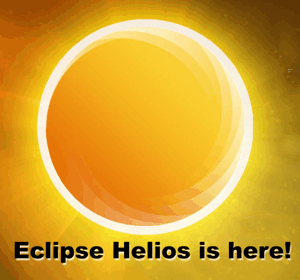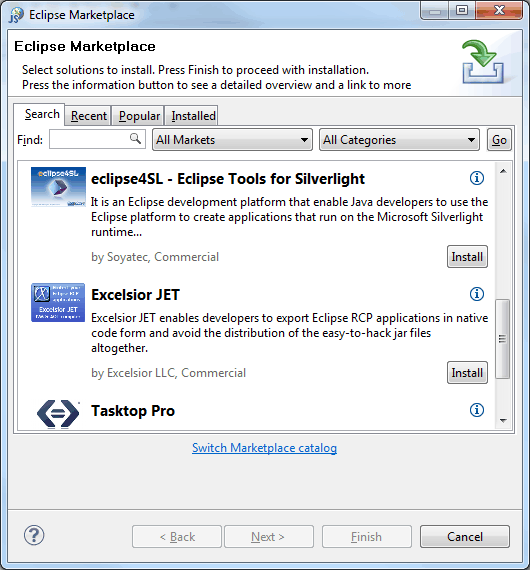| Enter the new Eclipse - Helios |
| Written by Ian Elliot | |||
| Wednesday, 23 June 2010 | |||
|
The sun has just set on Galileo, the previous version of the Eclipse IDE, and risen on Helios the latest version. It promises to be more stable, but its help and documentation are a big disappointment.
As well as the Java IDE we also have versions for PHP, C/C++mobile, Rich Client or Rich Ajax and Javascript developers and for SOA. All-in-all we have 12 pre-bundled versions, but of course the plug-in architecture of Eclipse means you can build your own customised IDE which handles a mix of technologies. There are in all a total of 39 different projects within the Helios project. Support for Window 7, Ubuntu 10.04 and PowerPC 64-bit have been added. What is new and exciting in Helios depends very much on what you are doing. Many of the improvements and additions will seem esoteric if you are just interested in turning out a simple PHP page or C++ project. As important as all of the headline improvements, however, are the large number of fixed issues and general improvements which should make Eclipse more stable. This said it has to be kept in mind that many of the Eclipse projects are still fairly new for such complex code. For the core Java users the IDE has had many new features added to it - code formatters, a breakpoint details pane and a number of analysis and profile improvements. You can also create virtual folders within the Project Explorer which don't correspond to physical folders on disk but contain other virtual folders and links to files stored in other locations. At long last you can now drag-and-drop files and folders onto the Project Explorer and control how they are treated - either copied or linked from their original location. If you want to use WebKit as your development browser then you can replace Mozilla. Of particular note across the projects are: The JavaScript Development Tools project (JSDT)This is an IDE designed to give Javascript programmers a modern development facility. It is a re-worked version of the Java Development Toolkit so as to work with Javascript. It comes preconfigured with the Rhino debug system. It can be used to build pure Javascript programs and embedded Javascript within HTML files. However, many Javascript programmers will find this less than perfect because it still doesn't have an easy to use drag-and-drop HTML editor. Linux tools This aims to bring a C/C++ IDe to Linux developers. It includes many tools that previously had to be used from the command line or manually integrated with the development process - GNU, Autotools, OProfile etc. Sequoyah This is an attempt to provide a unified mobile development IDE. At the moment most mobile developers make their own plugin for Eclipse Xtext a language development framework. Not everyone will want to make use of this new facility but if you are interested in Domain Specific Languages or even your own full programming language it might make the job easier. You can use it to describe the syntax and semantics of a language. RAP - Rich Ajax Platform is something of a puzzle when you first hear about it. At first it seems to be a way to bring the Eclipse UI to a browser so that you can us it as yet another interface layer for your rich Internet application. However it not only brings the UI but the entire Eclipse programming model. This probably isn't going to be of much interest to you at the moment unless you already use the Eclipse model to create applications. But if things go according to plan it could provide a new way of targeting multiple environments - for example there is already RAP for iPad. Also new is Git support and while Git may not be the most popular source control package - see Eclipse Community Survey Reveals .... what? - but it is important within the open source community. Taking a leaf out of Apple's and various others' books Helios includes a MarketPlace where you can offer your own plugins - commercial or open source. The MarketPlace is available from within Eclipse from the Help tab. Vendors can create custom market places for their products. Also included, with the help of Google,is Eclipse Labs, this is an open source development facility for Eclipse plugins that it is hoped will populate the MarketPlace.
The big problem with any Eclipse release if finding out what it's all about and what you have to do to start using it. As with most open source projects, the documentation is terrible and idiosyncratic. Given time on-line tutorials and third -party documentation, books, howtos,.. will start to catch up with the new release but for the beginner it's initially an impenetrable wall. It's not just basic documentation that is a problem. Finding out what any given Eclipse package or project does can be next to impossible. If you don't already know what it's is all about then the only way to find out is to download and experiment. This isn't helped by the fact that currently the web-based help system seems to have a bug that stops it working. The Eclipse project is often flaky on features used by beginners - it's probably because the Eclipse developers test the cool interesting stuff and mostly ignore anything trivial. In addition the whole approach of the Eclipse documentation is to tell you about the development process of the project, how it was started, how many milestones have been kicked over and so on. All very personally satisfying but useless for the beginner who might actually be tempted to use this free IDE. And if you want an example of how not to do tutorial videos have a look at any of the demos - especially the one on the PHP version. They are prime evidence that if you really can't be bothered to do the documentation then don't use the tutorial video as an excuse -see Down with the Video Tutorial!
Adding easy to follow feature descriptions and introductory explanations to the front pages of the web site would probably increase the take up of Eclipse by a factor of 10 or more. Just because it's open sources doesn't mean it has to lack commercial acumen We can all look forward to next year's simultaneous release of all the Eclipse projects called Indigo - somehow it doesn't sound quite as exciting as Helios. Perhaps they should go back to the moons of Jupiter after a short break.
<ASIN:0321603788> <ASIN:0321553462> <ASIN:0321288157> <ASIN:1430218835> <ASIN:0596100655> <ASIN:0321534077> <ASIN:0321585712> |
|||
| Last Updated ( Thursday, 24 June 2010 ) |


